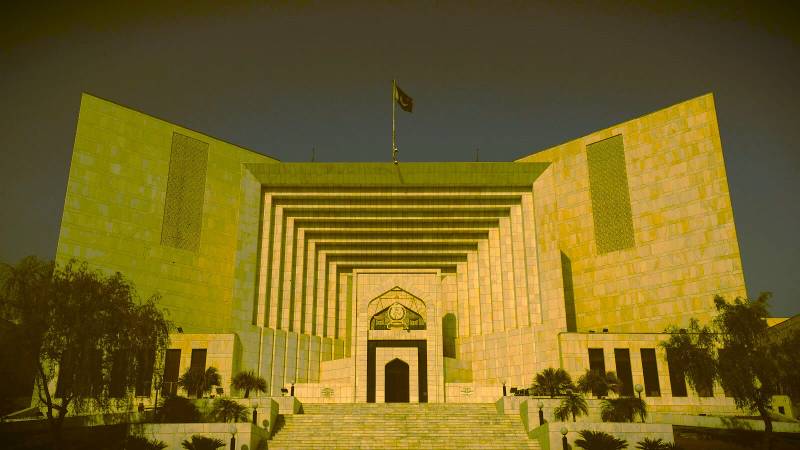
Expanding the scope of the maintenance (child support), the Supreme Court has held that even after separation or divorce from his wife, a man is bound to support his children (especially daughters) until they complete their graduation.
The top court applied this interpretation in the case of Alaf Din versus Mst. Parveen Akhtar. It noted that although the petitioner was not bound to provide the maintenance for education at the higher levels, he was duty-bound to provide maintenance for his daughter until she completed graduation and was gainfully employed to support herself.
The case landed in the Supreme Court after Qudrat Ullah, the former husband of Shama Naheed, had challenged a November 30, 2022, verdict issued by the Lahore High Court (LHC) wherein it upheld a judgment by the appellate tribunal to fix Rs25,000 per month as the maintenance amount for his daughter Qurutul Ain. The girl is currently a university student and is supported largely by her mother.
In the Supreme Court, a three-judge bench headed by Justice Sardar Tariq Masood and comprising Justice Amin Ud Din and Justice Syed Hassan Azhar Rizvi heard the case for the child's maintenance. Authoring the eight-page judgment, Justice Rizvi discussed and determined the question of whether a father, who is a Muslim, is under any obligation to pay the expenses incurred on the education of his daughter/children or whether the maintenance of a child includes educational expenses.
The verdict held that the petitioner, Qudrat Ullah, had argued that his source of income comprised his pension worth Rs60,000 per month and that he has to support his family from his second marriage; thus, the maintenance fixed was beyond his means.
While moving the top court, he argued that the appellate court provided no plausible reasoning to justify such an exponential increase in the quantum of allowance.
While defending the LHC's order, Qudrat Ullah's former wife, Shama Naheed argued that the maintenance amount determined was necessary for continuing their daughter's studies, who was studying engineering at a private university. While the case was pending before the court, Qurutul Ain completed four semesters out of eight semesters.
The top court held that the word 'maintenance' is derived from the Arabic word 'Nafaq', which means "to spend", and the word is defined in Black's Law Dictionary as' financial support given by one person to another'.
Justice Rizvi cited a para from the book "Islamic Spirituality Foundations" authored by Nasar Sayyad Hossein, wherein it stated, "Undeniably, the Almighty Allah is the only sustainer, but, He has created means through which this task is accomplished. Bearing the expenses of children is the second most important task of the father."
Justice Rizvi observed that in Islamic law, ,' maintenance' is termed as Nafaqah and signifies all the things thatnecessary to support life.
"It is the legal and religious duty of a man to maintain his wife and children. All the civilized nations of the world have recognised that children have rights by virtue of being children," the top court observed, adding that these obligations are also erga omnes (those obligations that are owed to the international community as a whole) and have since been codified in the United Nations Convention on the Rights of the Child, 1989.
Pakistan, the judgment stated, ratified the UNCRC on November 12, 1990, with its only reservation that its clauses would be interpreted in light of Islamic injunctions.
"However, in 1997, this reservation was withdrawn, thus, ratification became absolute," the court noted.
"When assessing and determining the best interests of a child, the obligation of the State to ensure the child such protection and care as is necessary for his or her well-being should be taken into consideration."
"Children's well-being, in a broad sense, includes their basic material, physical, educational, and emotional needs, as well as needs for affection and safety," observed Justice Rizvi, adding that it is in the best interests of the child to have access to quality education, including early childhood education.
"The above discussion leads us to draw a conclusion that it would be absolutely safe to include educational expenses also within the concept of maintenance of a child."
The top court said that, admittedly, the daughter is unmarried and thus requires sufficient support.
"In the trial as well appellate court, Respondent No.3 (Shama Naheed) has sufficiently established, with cogent evidence, that besides receiving pension, the petitioner (Qudrat Ullah) has other sufficient sources of income. Thus, he has the ability to pay her educational expenses."
The top court has held that the reasoning of the appellate court is justified and plausible, and before enhancing the maintenance amount, the appellate court undertook an analysis of expenses and concluded that the sum of Rs25,000 was required to ensure the continuation of his daughter's studies.
"Therefore, the amount of maintenance so granted is neither excessive nor unjustified," the court ruled.
"Normally, this Court refrains from intervening in concurrent findings unless they are unreasonable, arbitrary, imaginative, or whimsical. Petitioner has failed to point out any illegality or infirmity so also non-reading or misreading of evidence, hence, no case for interference has been made out."

